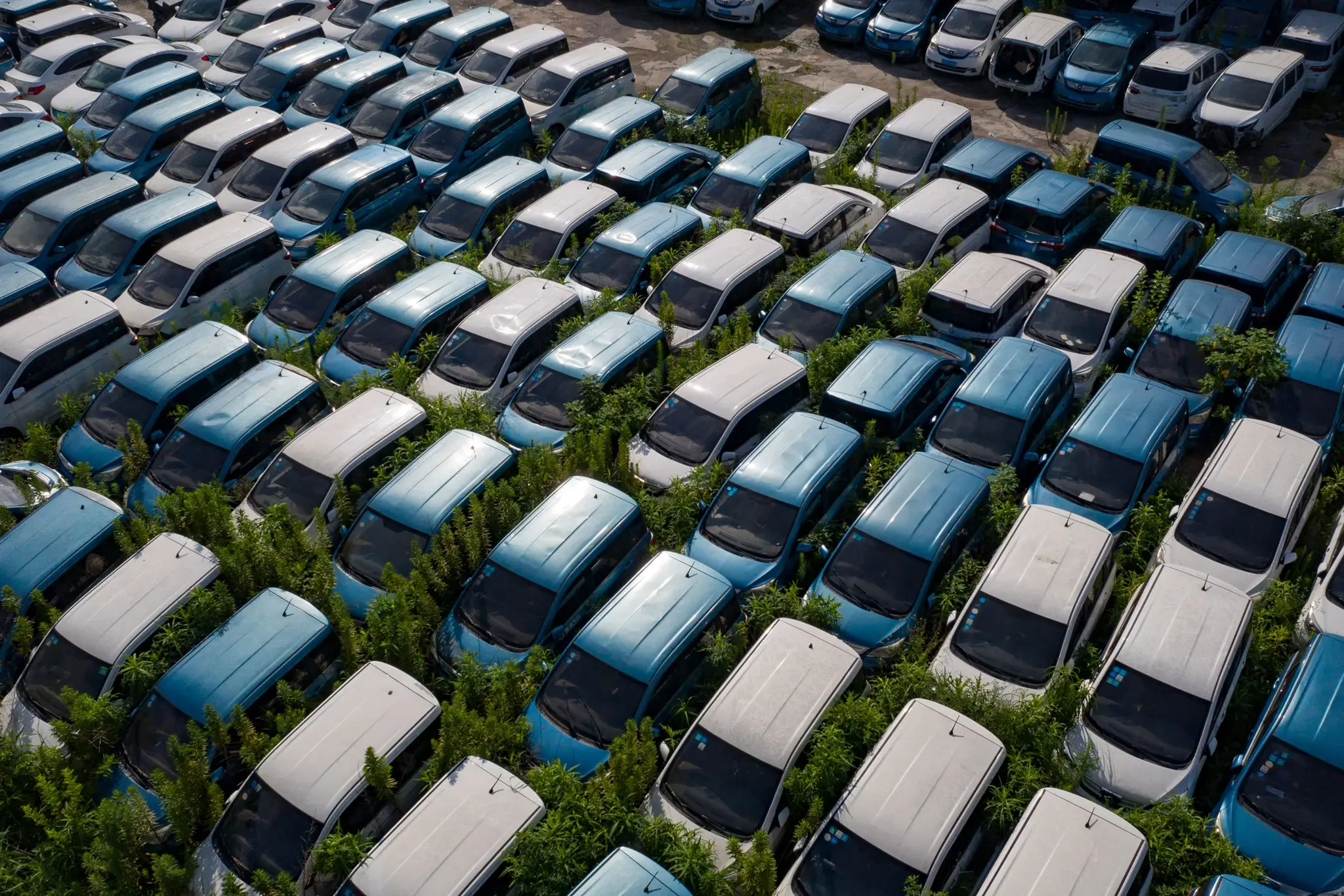A subsidy-fueled boom helped build China into an electric-car giant but left weed-infested lots across the nation brimming with unwanted battery-powered vehicles.
TLDR: A bunch of ride sharing companies sprouted up in the 2010s built around no frills EVs they leased to employees and then most of them consolidated or went out of business a few years later, leaving parking lots of used vehicles. Expect them to be auctioned off to either be recycled or hopefully sold on to lower wage nations.
Let’s hope they’re auctioned and sold quickly and don’t end-up in tangled in the legal system for too long. Hopefully this is handled well enough so cars get into the used car market. Selling these for scrap or for recycling is another option but would be more wasteful.
Unfortunately most of those cars will have to be scrapped. Either they’ve been abandoned for too long or they weren’t usable in the first place. Best we can hope for is that the damn things will be responsibly recycled.
Why would three to four years be to long for a car to sit around without being scraped? Short of the batteries self discharging brlow limits, which admittedly might happen with the cheap ac-dc converters and other electronics you might find in a low budget EV, i can’t imagine there would be much more than a tire change.
“No frills” might be a bit gentle.
Judging by other companies with similar outcomes, these are likely products made to meet the minimum legal definition of “vehicle,” and usually nonfunctional or minimally functional. The companies that built the “vehicles” often sell them to themselves (or rideshare subsidiaries), cashed in the Chinese tax credit, and immediately discard them. For an example of this in action, see the SEC filings and investigative articles around Kandi’s fake sales figures. Also see Out of Spec’s Kandi K27 review for what I mean when I say “nonfunctional.”
The silver lining is that since the discarded EVs are basically made of tin foil with tiny batteries, it’s not as bad of a waste of natural resources as you might expect.
The cars the article is talking about were clearly used in service at some point, as it would seem a bit strange to put up makeshift covid mask warnings in the windows of cars that weren’t functional and at least in so far as our primary source identified them tended to have a minimum range of 100km.
Manufacturers identified included Chongqing Changan and Nessan’s Chinese subsidiary, I didn’t see any mention of Kandi.
Correct, Kandi wasn’t involved in this article, it’s just another documented example of this kind of behavior.
Except your alleging that these cars were obviously built solely to defend the government simply becuse a different unrelated company did defrauded the government even though by all accounts these were legitimate, if poorly thought out, companies.
They’ve been abandoned not because obsolete but because the unlimited unrestricted capitalism ordered to build a service that nobody wanted to use because “we must grow and be the first to hit the market whatever it takes”
Subsidies - Unrestricted Capitalism
Choose one.
Capitalism dictates maximizing profit by any means, including taking free money from the government.
A government giving out targeted free money, is not an “unrestricted capitalism” government.
China, is an aggressively capitalist society, colliding with a strongly communist facade. Or a disaster in slow motion.
China is an instance of State Capitalism, where the government owns the means of production, and uses it for profit-generation. The only reason that anyone in the West actually believes it’s at all Communist is because we’re so indoctrinated by Red Scare propaganda that most people can’t tell the difference between “workers own” and “the government owns”, since the only kind of private ownership we recognize is ownership by oligarchs/corporations.
Subsidies are by definition not a restriction on bad behavior but an incentive. There is no reason a company can’t ignore a subsidy if it doesn’t want to.
Subsidies skew the market toward specific sectors, technologies, or actors. A company that do not benefit from subsidies is at a competitive disadvantage vs a company that do get subsidies.
A totally free market wouldn’t have any subsidies. But markets aren’t totally free in practice.
Subsidies are typically a good thing when it benefits cleaner tech or improving energy efficiency. It’s the fossil fuel subsidies that do the most harm.
Reminder that capitalism doesn’t mean free market.
That’s part of it, even if that’s not the only part.
Central characteristics of capitalism include capital accumulation, competitive markets, price systems, private property, property rights recognition, voluntary exchange, and wage labor.
Sure, in the same way that a central characteristic of Communism is being a Stateless society, even though that part never seems to happen either (thanks, Lenin). “True Capitalism has never been tried before!”
I would argue that being horriblely disadvantaged by not getting free money is not in fact a restriction on the market.
That’s technically correct. It’s not a restriction. But it’s not a neutral for the market either.
Of course it’s not neutral, but we’re talking about wether or not it is comparable with unrestricted capitalism.
China is not a country that gives subsidies but a corporation that invests in branches it wants to grow
First bicycles, then electric scooters/mopeds, now EVs.
Capitalism is all about waste.
Only if it earns a profit.
I thought china used communism
China’s system is technically communism in the same way the Bud Light is technically beer.
Then you are many decades out of date.
Mountains of perfectly cromulent bicycles…
It should not even be a crime to “claim” one at this point.
I recall watching this video sometime back covering this from the subsidy angle with new cars being made and then dumped just for the subsidy.
Yup, and I remember clearly a whole army of plausibly state sponsored shills downplaying/voting the story
I don’t understand why they wouldn’t introduce a trade scheme for petrol car owners: swap your petrol pollution machine for a free EV!
Also, why not sell these cars to be retrofitted with better batteries? Wouldn’t it be cheaper that building a whole new car? How is there no industry around this?
A guess is that those cars are so bad that nobody wants them even for free.
Becuse that requires the government own them, which requires that they finish working their way though bankruptcy court. Some already have, and the rest should follow sooner or later.
Why would the government have to own them? Plus, it’s China. The government can persuade pretty much any national company to do their bidding. Sometimes they even persuade foreign companies to do their bidding *cough* Google Apple *cough*
Because it’s kind of hard to eminent domain the subject of an ongoing legal battle?
Really? The “communist” government that builds highways around the homes of people who don’t want to move, disappears business owners who don’t fall in line with the party mandate, and forces private companies to spy in their interest will find it “kind of hard” to nationalize resources of a private company?
I’d like to remind you that China isn’t Europe or the US.
You will note that none of thouse things might involve repossessing things party members might own a stake in the same way that they would a failed company.










